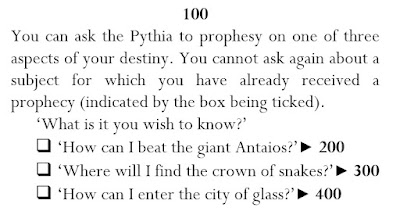Why put the Oracle into a gamebook? Simple. I was hired to write for the Vulcanverse series, and the background they'd chosen was Greek myth. My personal preference in fantasy is for original settings like Tekumel, but the Greek angle made it easy. I just had to arm myself with a copy of Graves and figure out which stories to use in the books.
In fact there was another reason I wanted to do something with the Oracle. I'll come to that later.
The sixty-four thousand drachma question: how to use oracles in a gamebook? Prophecies are tricky enough in roleplaying games, where you have a bit of latitude in interpretation and you can if need be nudge events in line with what's supposed to happen.
Here's the way I planned to do it. You can request a prophecy on one of several tasks. First you must pay a lava gem to be admitted to see the Pythia, then:If you meet Antaios after you've already seen the Pythia, and so have the codeword DoneAntaios, then the prophecy will come true with your inevitable defeat. But if you meet Antaios before you've visited the Pythia and been given the codeword by her then you get the usual “unfated” encounter, meaning that you have a chance to defeat him. Without the prophecy, your fate is in your own hands. Then at the end of that encounter you'll get the codeword DoneAntaios which ensures the Pythia can’t give you a prophecy about something that's already happened.
That's the bad outcome. The other two questions, about the crown of snakes and the city of glass, would be answered with prophecies that guaranteed success -- assuming you visit the Pythia before undertaking those quests. (The player shouldn't know in advance which question will get a bad prophecy and which will get good outcomes, of course.)
The other reason for putting an Oracle into the Vulcanverse books is that they are open world adventures. My original idea for those (see Cities of Gold & Glory, for example) was that players could define their own goals. That's what my role-playing campaigns tend to be like. If a PC decides they want to climb the highest mountain in each of the kingdoms, for example, they can just go and do it. If there are pre-planned quests you have to come across them, not be handed them. But many gamebook fans and players of traditional D&D are accustomed to being given an objective at the start. "Your mission, should you choose to accept..."
The Oracle is a way of giving players a choice. Want an assigned quest? Go to the Oracle -- but she might doom you to failure before you've even begun. Or you can go looking for your own adventures, disdaining any sense that destiny controls you; be the captain of your own fate. In the Vulcanverse, the choice is yours.








Out of interest, have you ever considered using spoiler alerts?
ReplyDeleteSeriously I've got the first 3 - pillers, hammer and the one about Hades, just waiting for a few pay packets to accrue before striking out for the wild woods. Havn't played them yet (there is a certain time commitment to a paper game book). Just picking them up and reading random paragraphs is enthralling enough at this stage.
Is there and update on house of the gods release date?
Don't worry, I wouldn't use actual examples from the books here on the blog, so no need to worry about spoilers!
DeleteI'm currently writing the endgame sequence for the fifth book. It's taking longer than I thought because I'm an idiot -- I mean, because I have to factor in what the player has done in the other four and a half books before they reach the endgame. I have over 20,000 words of *notes* for this part of the book so it may be quite a big one.
Ideally I'll finish writing the book by April. Then I need to exhaustively check the flowchart and typeset it. I think we're looking at a summer release date, so no rush getting started on those other books. (In fact I think book 5 is probably the best one to start in, as you get hints about the quests in the other four books.)
There is definitely a benefit to waiting until you have them all, as they feel more like a single MASSIVE gamebook than even the Fabled Lands books did. I feel like there's more links between them than there were in Fabled Lands, though that is based on my memory of playing FL 25 years ago, so may well be wrong! That said, I still remember how Amcha One-Eye eluded me as I never did manage to get hold of Over the Blood Dark Sea! xD
DeleteI liked the sense of separateness in the Fabled Lands since it gave the feeling of journeying between distant and very different lands. But I also rather like that strong feeling of connection in the Vulcanverse books - it makes it feel more like you are wandering in a single connected land. I've found I basically needed to go and do the "easy" quests in the different books so that I could get all things I needed for the tougher ones. It definitely rewards exploring widely.
Vulcanverse is proving a lot harder to write than Fabled Lands, and partly that's because there's a lot more cross-connection between the books. And that makes sense because it's a smaller world, or anyway feels smaller because the Graeco-Roman culture applies to all the regions.
DeleteThe total length of the series will be nearly 5000 sections and 600,000 words, which amounts to more than six FL books. I'm recommending new players start with book 5, because there will be many more hints there on all the quests. Also, being born in the city rather than in a rural area makes a difference.